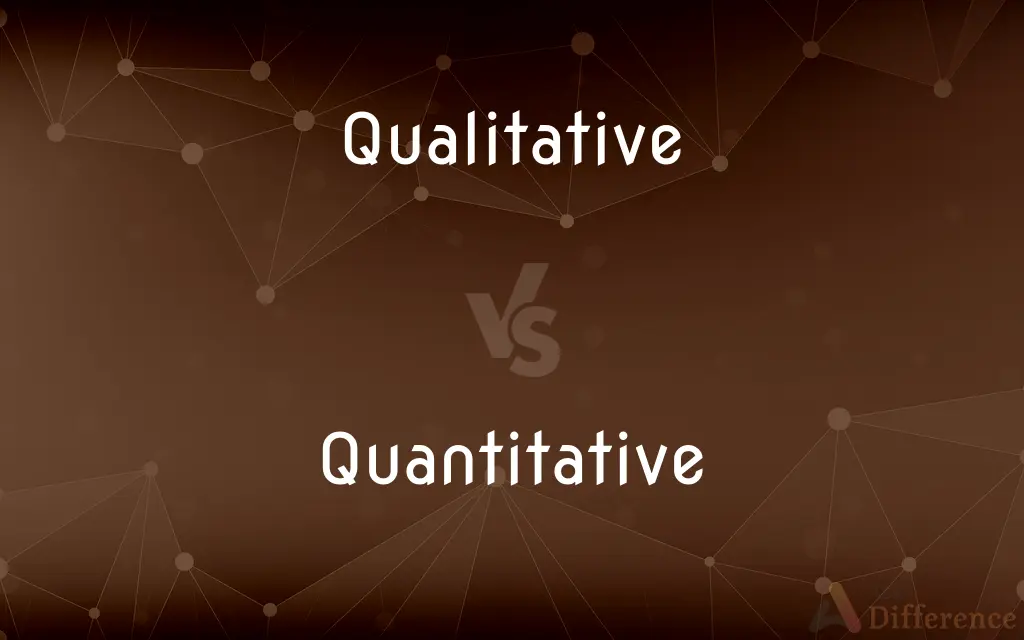Qualitative vs. Quantitative — What's the Difference?
By Tayyaba Rehman — Updated on September 23, 2023
"Qualitative" refers to research or data focusing on non-numerical characteristics, such as color, texture, or type. "Quantitative" refers to research or data that can be measured numerically, such as height, weight, or speed.

Difference Between Qualitative and Quantitative
Table of Contents
ADVERTISEMENT
Key Differences
"Qualitative" and "Quantitative" are terms often used in the context of research, data collection, and analysis. Qualitative data explores characteristics that can be observed but not measured. These characteristics often include attributes like texture, color, or taste. On the other hand, quantitative data can be measured and expressed in numbers, such as percentages, scales, or counts.
Qualitative research generally aims to understand underlying reasons, opinions, or motivations and often relies on methods like open-ended surveys and interviews. It's more concerned with the "how" and "why" of things. Quantitative research aims for statistical analysis, usually through structured methods like questionnaires or polling, focusing more on the "how much" or "how many."
While both qualitative and quantitative data can provide valuable insights, they are usually best when used together. Qualitative research can offer context for quantitative data. For instance, qualitative data can explain why a particular set of quantitative results came to be. Conversely, quantitative data can provide a broad overview that qualitative research can then delve into for more detail.
In summary, qualitative and quantitative approaches serve different purposes and are often complementary. Qualitative data gives context and explores the intricacies of a subject, while quantitative data provides the numerical metrics that can be analyzed for trends and statistics.
Comparison Chart
Type of Data
Non-numerical
Numerical
ADVERTISEMENT
Focus
Characteristics
Measurements
Research Methods
Open-ended surveys, interviews
Structured surveys, polling
Analysis
Subjective
Objective
Common Uses
Context, reasons, motivations
Trends, statistics, patterns
Compare with Definitions
Qualitative
Focused on non-numerical characteristics.
The qualitative study looked at the colors people prefer.
Quantitative
Uses structured research methods.
The quantitative research used multiple-choice surveys.
Qualitative
Often based on observations and subjective analysis.
The qualitative data included personal interviews about experiences.
Quantitative
Aims for objective, numerical analysis.
The quantitative approach relied on measurable, numerical metrics.
Qualitative
Explores underlying reasons and motivations.
The qualitative analysis delved into why people like certain brands.
Quantitative
Provides broad overviews of subjects.
Quantitative data showed the percentage of people who prefer online shopping.
Qualitative
Usually provides context to quantitative data.
Qualitative feedback explained the reasons behind the sales numbers.
Quantitative
Concerned with numerical measurements.
The quantitative analysis counted the number of visitors to the website.
Qualitative
Of, relating to, or concerning quality.
Quantitative
Focuses on statistical analysis.
The quantitative study evaluated test scores across districts.
Qualitative
Of descriptions or distinctions based on some quality rather than on some quantity.
Quantitative
Expressed or expressible as a quantity.
Qualitative
(chemistry) Of a form of analysis that yields the identity of a compound.
Quantitative
Of, relating to, or susceptible of measurement.
Qualitative
Something qualitative.
Quantitative
Of or relating to number or quantity.
Qualitative
Relating to quality; having the character of quality.
Quantitative
Of or relating to a metrical system based on the duration of syllables rather than on stress. Used especially of classical Greek and Latin verse.
Qualitative
Involving distinctions based on qualities;
Qualitative change
Qualitative data
Qualitative analysis determines the chemical constituents of a substance or mixture
Quantitative
Of a measurement based on some quantity or number rather than on some quality
Qualitative
Relating to or involving comparisons based on qualities
Quantitative
(chemistry) Of a form of analysis that determines the amount of some element or compound in a sample
Qualitative
Uses open-ended research methods.
The qualitative study involved long-form interviews and discussions.
Quantitative
Relating to quantity.
Quantitative
Expressible as a quantity or relating to or susceptible of measurement;
Export wheat without quantitative limitations
Quantitative analysis determines the amounts and proportions of the chemical constituents of a substance or mixture
Quantitative
Relating to the measurement of quantity;
Quantitative studies
Quantitative
(of verse) having a metric system based on relative duration of syllables;
In typical Greek and Latin verse of the classical period the rhymic system is based on some arrangement of long and short elements
Common Curiosities
What is Quantitative data?
Quantitative data is numerical and can be measured, like height, weight, or speed.
What are Qualitative research methods?
Qualitative methods include interviews, open-ended surveys, and observations.
Is Quantitative data objective?
Yes, quantitative data aims for objective, numerical analysis.
What is Qualitative data?
Qualitative data focuses on non-numerical characteristics like color, texture, or feelings.
Is Qualitative data subjective?
Yes, qualitative data often relies on subjective interpretation.
What is a Quantitative variable?
A quantitative variable can be measured numerically, like height or speed.
What are Quantitative research methods?
Quantitative methods include structured surveys, experiments, and statistical analysis.
What is a Qualitative variable?
A qualitative variable is a non-numerical category like color or type.
How is Qualitative data analyzed?
Qualitative data is usually analyzed through thematic analysis or coding.
Can Qualitative and Quantitative be used together?
Yes, they often complement each other in research studies.
How is Quantitative data analyzed?
Quantitative data is analyzed using statistical methods.
When should I use Quantitative research?
Use quantitative research for measurable, statistical analysis.
Which is more reliable, Qualitative or Quantitative?
Quantitative data is often considered more reliable due to its numerical nature.
Which provides more context, Qualitative or Quantitative?
Qualitative data usually provides more context to understand underlying reasons.
When should I use Qualitative research?
Use qualitative research when you need to explore ideas or understand context.
Share Your Discovery

Previous Comparison
Missile vs. Rocket
Next Comparison
Raze vs. RaiseAuthor Spotlight
Written by
Tayyaba RehmanTayyaba Rehman is a distinguished writer, currently serving as a primary contributor to askdifference.com. As a researcher in semantics and etymology, Tayyaba's passion for the complexity of languages and their distinctions has found a perfect home on the platform. Tayyaba delves into the intricacies of language, distinguishing between commonly confused words and phrases, thereby providing clarity for readers worldwide.















































